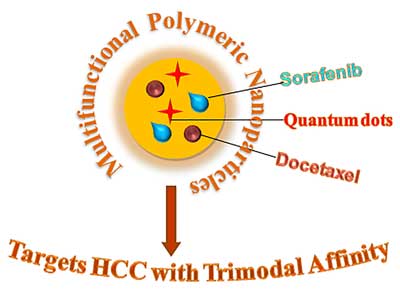| May 14, 2020 | |
Multifunctional polymeric nanoparticles with trimodal affinity for liver cancer therapy |
|
| (Nanowerk Spotlight) Hepatocellular carcinoma (HCC) is is the most common type of primary liver cancer and one of the most aggressive and hyper-vascularized forms of cancer. Many current chemotherapeutics fail to achieve the effective therapeutic index in the solid tumours due to poor drug penetration, poor bioavailability, non-specificity and drug resistance – a challenging aspect in this field. | |
| In search of new modalities, researchers at the Indian Institute of Technology Bombay, Mumbai, India have developed multifunctional polymeric nanoparticles against HCC. This single nano-platform approach holds a granted Indian patent (Poojari, R., Panda, D and Srivastava, R. Multifunctional polymeric nanocarrier. Indian Patent Granted No. 317866, (2019)). | |
| These biocompatible multifunctional polymeric nanoparticles hold trimodal affinity towards targeting microtubules, tyrosine kinases, and high-sensitivity imaging system quantum dots. | |
| The researchers investigated the intracellular interactions of the multifunctional polymeric nanoparticles in HCC cells. | |
 |
|
| Multifunctional polymeric nanoparticles for liver cancer therapy. (Image: Department of Biosciences and Bioengineering, Indian Institute of Technology Bombay) | |
| The indepth study revealed that this multifunctional polymeric nanoparticle modality leads to potent anti-proliferative, apoptotic, anti-angiogenic, microtubule bundling and antimitotic activities compared to the single drug monotherapy in HCC cells. It strongly inhibited the tyrosine kinase expression in HCC cells. The multifunctional system showed the real-time high sensitivity of quantum dots in HCC cells. | |
| Leveraging the potential application of multifunctional polymeric nanoparticles for safe and more efficient liver cancer therapy is amenable, says Dr. Radhika Poojari, the lead author of the research paper (Nanomedicine, "Antihepatoma activity of multifunctional polymeric nanoparticles via inhibition of microtubules and tyrosine kinases"). | |
| In vivo studies of the multifunctional polymeric nanoparticles in HCC models are still required. The research team is looking to partner with biopharmaceuticals companies for a technology transfer of the synthesized formulation. | |
|
Provided by Department of Biosciences and Bioengineering, Indian Institute of Technology Bombay, Mumbai
|
|
|
Become a Spotlight guest author! Join our large and growing group of guest contributors. Have you just published a scientific paper or have other exciting developments to share with the nanotechnology community? Here is how to publish on nanowerk.com. |
|
